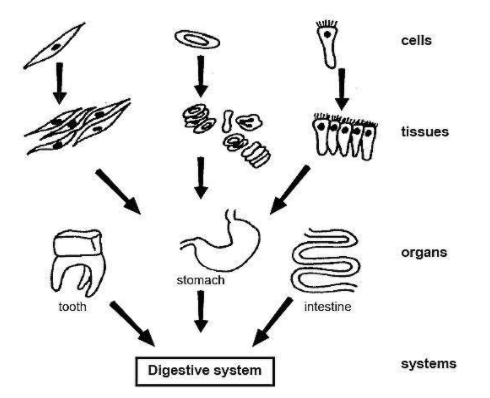
The _______ is the basic structural and functional unit of life.
A. Tissue
B. Organ
C. Cell
D. Organelle
Answer
582k+ views
Hint: Every living organism is made up of the smallest and basic unit of life called a cell. A cell can divide independently. Groups of cells form tissues while groups of tissues form organs which further from the organ system of living organisms when grouped.
Complete answer:
A cell is the basic unit of life as it is responsible for all the basic life processes. It can divide independently, forming new tissues, organs, etc. Hence, they act as building blocks or structural units of living organisms. Cells are also known to carry out certain functions in living organisms to sustain the living which also makes them the functional unit of life. They are known to get modified into specialized cells that are known to carry out specific functions in the body like RBCs (Red Blood Cells) are known for carrying oxygen and carbon-dioxide from and to the lungs, respectively. Thus, the basic structural and functional unit of life is a cell.
The tissue is not a single unit but is composed of groups of cells that have a similar structure which further acts together to perform a specific function.
An organ is a group of tissues that perform specific functions. These organs are then grouped to form organ systems in higher animals.

An organelle is a structure present in the cytoplasm of cells to carry out specific functions within the cells. Different organelles present in the cytoplasm of cells are the nucleus, mitochondria, endoplasmic reticulum, lysosomes, Golgi apparatus, ribosomes, vacuole, cytoskeleton, etc.
Hence, the correct option is (C).
Note: The basic structural and functional unit of life is the cell as it acts as building block units of living organisms and performs basic functions of living organisms for sustaining their life.
Complete answer:
A cell is the basic unit of life as it is responsible for all the basic life processes. It can divide independently, forming new tissues, organs, etc. Hence, they act as building blocks or structural units of living organisms. Cells are also known to carry out certain functions in living organisms to sustain the living which also makes them the functional unit of life. They are known to get modified into specialized cells that are known to carry out specific functions in the body like RBCs (Red Blood Cells) are known for carrying oxygen and carbon-dioxide from and to the lungs, respectively. Thus, the basic structural and functional unit of life is a cell.
The tissue is not a single unit but is composed of groups of cells that have a similar structure which further acts together to perform a specific function.
An organ is a group of tissues that perform specific functions. These organs are then grouped to form organ systems in higher animals.

An organelle is a structure present in the cytoplasm of cells to carry out specific functions within the cells. Different organelles present in the cytoplasm of cells are the nucleus, mitochondria, endoplasmic reticulum, lysosomes, Golgi apparatus, ribosomes, vacuole, cytoskeleton, etc.
Hence, the correct option is (C).
Note: The basic structural and functional unit of life is the cell as it acts as building block units of living organisms and performs basic functions of living organisms for sustaining their life.
Recently Updated Pages
Master Class 12 Economics: Engaging Questions & Answers for Success

Master Class 12 Physics: Engaging Questions & Answers for Success

Master Class 12 English: Engaging Questions & Answers for Success

Master Class 12 Social Science: Engaging Questions & Answers for Success

Master Class 12 Maths: Engaging Questions & Answers for Success

Master Class 12 Business Studies: Engaging Questions & Answers for Success

Trending doubts
Which are the Top 10 Largest Countries of the World?

What are the major means of transport Explain each class 12 social science CBSE

Draw a labelled sketch of the human eye class 12 physics CBSE

Why cannot DNA pass through cell membranes class 12 biology CBSE

Differentiate between insitu conservation and exsitu class 12 biology CBSE

Draw a neat and well labeled diagram of TS of ovary class 12 biology CBSE




